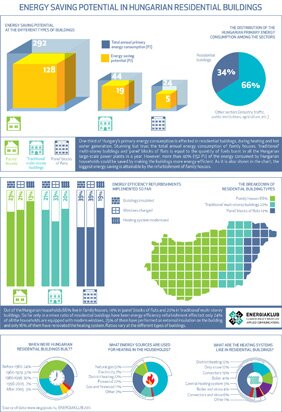NegaJoule2020 research project
"Negajoule" is the title of our research project mapping the energy efficiency potential of Hungarian buildings. With this imaginary unit we refer to the possible energy savings, the amount of energy not being consumed.
While residential buildings account for one third of Hungary's primary energy use, only a small proportion of households have improved the energy efficiency of their homes. The most important finding of the NegaJoule research project is that the primary energy consumption of Hungarian residential buildings could be reduced by 40%, 152 PJ if all the available energy efficiency refurbishments were implemented. The energy saving potential can be further increased by the use of renewable energy sources.
In 2013, our research was amended by analysing the energy efficiency potential of state-owned educational and office buildings: according to our results, more than 3 PJ could be saved by energy efficient refurbishments.
The Negajoule research project is unique in Hungary: on one hand, calculations were preceded by a representative, large-scale statistical sampling that served with detailed basic data necessary for the study. On the other hand, hundreds of energy calculations – basically sample energy performance certificates - were prepared on various types of buildings by an energy engineer. Regarding public buildings, we have analyzed data of the Hungarian National Asset Management Inc.’s database on approximately 12,000 state-owned buildings.
Our research project was carried out with the objective of showing to decision-makers and to other experts and non-professionals interested in this subject, what an energy efficiency potential is lying in Hungarian buildings. Our findings can support the elaboration of energy effciciency programs and the revision of the National Energy Efficiency Action Plan as well.








